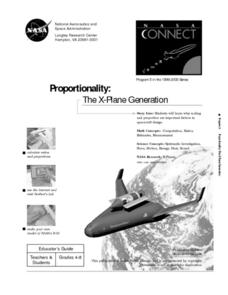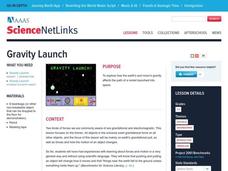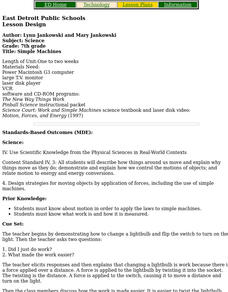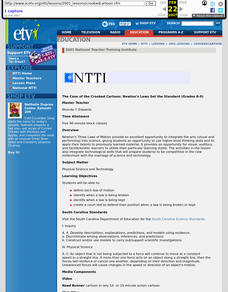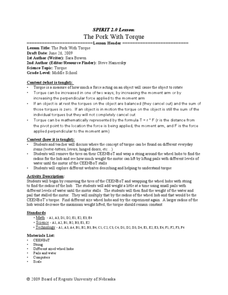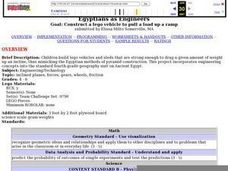NASA
Make a Planetary Exploration Balloon
Balloons aren't just for parties! An inquiry-based lesson explores the idea of using balloons for space exploration. Learners become engineers as they attempt to control the ascent and descent of a helium balloon using different masses.
Curated OER
Proportionality: The X-Plane Generation
Students meet NASA researchers who describe the relationship between force, energy and motion. They discuss how NASA's experimental X-plane is being tested to make space travel more reliable and show how proportionality and ratios are...
Curated OER
Gravity Launch
Students examine how gravity affects launching rockets into space. In this physical science lesson, students review the concept of gravity and use an interactive online site, "Gravity Launch," to simulate a rocket launch.
Curated OER
How Fast Does the Sun Spin?
In this rotation of celestial bodies worksheet, students determine the speed of the sun's rotation and they determine the number of days it takes the sun to rotate once at the equator. They identify the geometric factor that causes...
Curated OER
Numerical Determination of Drag Coefficients
Young scholars create a video of an object falling with a drag. For this physics lesson, students calculate drag coefficient using data from Logger Pro. They calculate velocity and acceleration of the object.
Curated OER
The Sun Affects Earth
Third graders read, write, and listen to information about the sun and its effects on the Earth.as it relates to its axis, orbit, rotate, and revolution. In this solar system lesson, 3rd graders examine how the sun...
Curated OER
The Case of the Crooked Cartoon: Newton's Laws Set the Standard
Students have the opportunity to use higher-level thinking skills and to apply their talents to previously learned material. It provides an opportunity for visual, auditory, and tactile/kinetic learners to utilize their particular...
Curated OER
Weight and Velocity
Middle schoolers perform an experiment in order to determine how increasing weight affects the velocity of a truck and use the computer to compile their data.
Curated OER
The Drag of Drag
Young scholars are introduced to drag. Then they summarize drag by saying that the drag is proportional to the square of the velocity. Students then solve problems an example of such a problem: Explain why swimming underwater is faster...
Curated OER
Newton's Earthquake
Students discuss Newton's 2nd and 3rd laws using the example of a football linebacker and a small child pushing against each other on an ice rink. Students are able to visualize the results of the push and link it to the laws. Discussion...
Curated OER
Friction and Inertia
Learners study friction and inertia, make predictions, and compare data. In this investigative lesson students view a demonstration on friction, divide into groups, and complete an activity.
Curated OER
2D Kinematics w/ String Racers
Students calculate the speed of string racers. In this physics lesson, students measure the time in several trials and get the average. They graph their results using a spreadsheet.
Curated OER
Rocket Angles
Eighth graders create rockets that be launched at varying angles to determine which angle is best to launch at for the longest distance.
Curated OER
Weighing In
Third graders use a Slinky, rubber bands, paper, coins and cups to experiment with weight and its relationship to gravity. They discuss their results and develop a consensus on conclusion statements derived from their experiments.
Curated OER
The Pork With Torque
Students determine the torque of CEENBoTs wheel hub. In this physics lesson, students reinforce their learning by exploring interactive websites on torque. They give real life applications of torque.
Curated OER
Swinging on a String
Students explore how pendulums work and why they are useful in everyday applications. In a hands-on activity, they experiment with string length, pendulum weight and angle of release.
Curated OER
Egyptians as Engineers
Student design and build Lego vehicles that drag given amount of weight up an incline. They show how this demonstrates Egyptian methods of pyramid construction.
Curated OER
In-Line Inertia
Students practice calculating the moment of inertia when discussing a skater and the position in which it is best to spin. After class discussion, students practice calculating inertia on their own.
Curated OER
Balanced Forces
High schoolers are able to explain why football running backs benefit from having a lower center of gravity when opponents are trying to tackle them. They explain why racing cars are designed to have a low center of gravity. Students...
Curated OER
Toys and Forces
Third graders discuss the collection of toys and demonstrate to the class how a given toy moves. They discuss the part of this toy that could be broken or missing to cause the toy not to work. Which parts could be broken and the toy...
Curated OER
Pendulum Motion Experiments
Students experiment with simple pendulums to determine the validity of an equation for all angles. Students discover the usefulnes and limitations of approximations in science. Using spreadhseets and a java applet, students observe the...
Curated OER
Momentum
For this momentum worksheet, students review impulses, angular momentum, and the law of conservation of momentum. This worksheet has 30 fill in the blank statements.
Curated OER
Impulse/Momentum Lab
Learners investigate the relationship between force and momentum using motion detectors and sensors. In this physics lesson plan, students graph experimental results. They calculate impulse using the area under the graph.
Other popular searches
- Elementary Force and Motion
- Force and Motion Experiments
- Science Force and Motion
- Motion and Force
- Unbalanced Force and Motion
- Force and Motion Activities
- Force and Motion Unit
- Force Motion Energy
- Force and Motion Lessons
- Science Force Motion
- Force Motion and Energy
- Motion Force and Gravity

